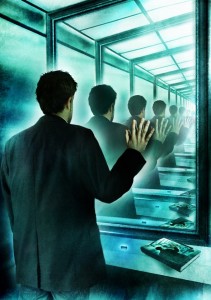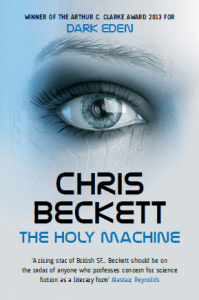There is already a British audio book version of Dark Eden (read by Oliver Hembrough and Jessica Martin), but I’m very much looking forward to hearing the new US audio book from Random House Audio which is still under development. This will involve 8 actors, so that the book’s various narrators can all have different voices, but what is particularly intriguing about it is that the producer Janet Stark and her cast of actors are attempting to develop a whole new Eden accent for the recording.
What will this sound like? Everyone in Eden is descended from just two people – a white man from Brooklyn, New York, and a black woman from Peckham in South London – so one thing that we can be sure of is that the accent will bear traces of both those different sources. During the early years too, the entire human population of Eden consisted of a single family – mum, dad, kids – and some of the characteristics of Eden English derive from that fact. Parents with little kids tend to simplify their speech, even when speaking to one another, and this effect would be even more pronounced in the absence of other adults (or the written word) to pull the speech of family members back in the direction of adult norms. This is the source of the use of double adjectives for emphasis – something that little children often do – and the tendency to drop direct articles, but it will have had an effect too on pronunciation and on the rhythms of Eden speech.
But all that is only part of the story. The accent of Eden would not just be a blend of its two sources. People play with language, change it like clothes. They get bored with saying things one way, and try another. New things appear and become cool, others fade out of use. Who could have predicted the trend towards a rising inflection at the end of a sentence in spoken English here on Earth, or the more recent fashion of beginning sentences with the word ‘So’? The people of Eden have lived in isolation for 160 years. Less than 160 years after white settlers first arrived in Australia, Australian English had developed its own distinct and instantly recognisable accent, and that was in spite of continuing contact with the mother country, and continuing large scale migration (even today more than 10% of Australians were born in the UK).
I think the spoken language of Eden would be slow. Both the source accents are fast, clipped and urban, but Eden folk are as rustic as it is possible to be, and rustic people tend to speak slowly (think Somerset, Queensland or Alabama). I think too that it would be more musical, more singsong. These are people with no TV, no books, no video games, no movies. The repetition of oral traditions is much more important to them than it is to us. I think they would savour language and linger over it in a way that we don’t.
As to those double adjectives which everyone notices (and some people hate!), I hear them with the first adjective emphasised and drawn out, with a slight fall at the end towards the lower, shorter repetition: B-I-I-I-G big.
But then again, sometimes Eden folk do it the other way round. They just feel like it. That’s what humans are like.

